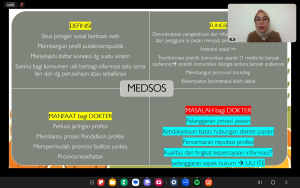Examining the Phenomenon of Aesthetic Surgery: Medical, Ethical, and Religious Perspectives
Yogyakarta, March 12, 2025 – The Center for Bioethics and Medical Humanities (CBMH) at Universitas Gadjah Mada held a RABOAN webinar featuring Dr. Prima Maharani Putri, M.H., C.Med. as the keynote speaker.
In her presentation, Dr. Prima discussed the growing trend of aesthetic surgery, which has gained increasing popularity in modern society. “Today, achieving a flawless appearance has become a priority in professional and social interactions. Many individuals choose plastic surgery to attain the beauty standards they aspire to,” she stated.
With the rapid advancement of information technology, the promotion of aesthetic surgery on social media has become more widespread, showcasing stunning physical transformations and shaping public perceptions of beauty. However, beyond its rising popularity, various bioethical considerations and religious perspectives must also be taken into account.
The webinar also explored different religious viewpoints on aesthetic surgery. In Islam, such procedures are permitted if they serve a rehabilitative purpose and provide medical benefits, but they are deemed forbidden if performed solely for beautification. Buddhism considers plastic surgery a positive action when done for health reasons but discourages it if pursued merely for aesthetic purposes. Meanwhile, in Protestant and Catholic Christianity, plastic surgery is acceptable for medical needs, such as reconstructive procedures due to congenital disabilities or injuries. In contrast, Hinduism generally discourages altering one’s physical form through plastic surgery.
Dr. Prima emphasized the importance of applying bioethical principles in aesthetic surgery practices. “Patients have the right to decide whether to undergo plastic surgery as long as it is not intended to deceive or harm themselves or others. Doctors must provide informed consent and consider ethical aspects, especially for patients who lack medical indications,” she explained.
The discussion in this webinar also aligns with the Sustainable Development Goals (SDGs), particularly Goal 3 (Good Health and Well-being) and Goal 10 (Reduced Inequalities). By examining aesthetic surgery through the lens of bioethics, religion, and mental health, this event aimed to raise public awareness of the social impact of beauty standards shaped by social media. Additionally, the webinar served as an educational platform for medical professionals and the public to better understand the importance of ethical healthcare services, ensuring that all medical procedures, including plastic surgery, provide genuine benefits to patients with clear medical indications.
The event concluded with the key message that medical professionals play a crucial role in educating the public and upholding ethical standards in aesthetic surgery. “Upholding ethics and moral values can encourage people to accept themselves as they are. Plastic surgery is not the ultimate measure of physical perfection,” Dr. Prima concluded.
Reporter : Ardhini Nugrahaeni, M.K.M.
Editor : Rafi Khairuna Wibisono, S.Kom

Follow us